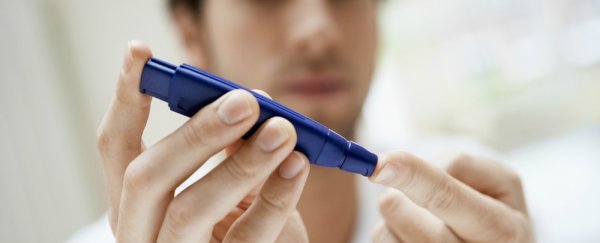Australian scientists from the University of Technology, Sydney (UTS), have created a line of insulin-producing cells that could eliminate the need for Type 1 diabetics to inject themselves with insulin.
The development on its own is pretty impressive, but the cells, which are derived from liver cells, are now on their way to being incorporated to a world-first bio-artificial pancreas after being licensed by US biotechnology company PharmaCyte Biotech last October.
PharmaCyte Biotech has already acquired something called the Cell-in-a-Box® system, which is basically a tiny cellulose-based 'capsule' that can house artificial cells and integrate them into a human body. This platform can be used to develop treatments for any disease where cells aren't releasing the molecules they're supposed to, but after acquiring the license to the insulin-producing cells, it's clear that PharmaCyte Biotech has set their sites on targeting Type 1 diabetes.
Type 1 diabetes or juvenile-onset diabetes is an autoimmune disease that occurs when a person's immune system attacks their pancreas's islet cells and prevents it from properly regulating the body's blood glucose levels by releasing insulin.
The new cell line, called "Melligen" cells, is derived from human liver cells, which have been genetically modified to take over the role of the pancreas's insulin-producing islet cells.
"When a foetus develops, the liver and the pancreas form from the same endodermal origin," explained Ann Simpson from UTS:Science, who has been developing the cells over the past 20 years, in a press release. Which means that they should have the potential to do the same things as one another.
Early lab trials have shown that the genetically modified Melligen cells are able to release insulin in direct response to the amount of glucose in their surroundings - something that could help type 1 diabetics to live without daily injections and regulate their blood sugar levels naturally.
"My team and I are excited by the prospect of working with PharmaCyte Biotech to eliminate daily injections for insulin-dependent diabetic patients," said Simpson in the release.
The next step for the company is for PharmaCyte Biotech to embed clusters of the Melligen cells into the Cell-in-a-Box® capsule, which is around the size of a pin head.
These artificial pancreases will then be transplanted into animals to test whether they can effectively integrate into the body and regulate insulin levels. After that, they can begin testing the technology in humans.
Several other groups are now working on artificial pancreases that use sensors under the skin, or even temporary tattoos to monitor blood glucose levels. But these systems all require a pump to control the amount of insulin required in response to these levels, rather than biologically sensitive cells.
It's pretty exciting to see all the ground-breaking work on diabetes and insulin-producing cells finally be commercialised into a product that could directly change people's lives.
Love science? Find out more about the research happening at UTS:Science.
